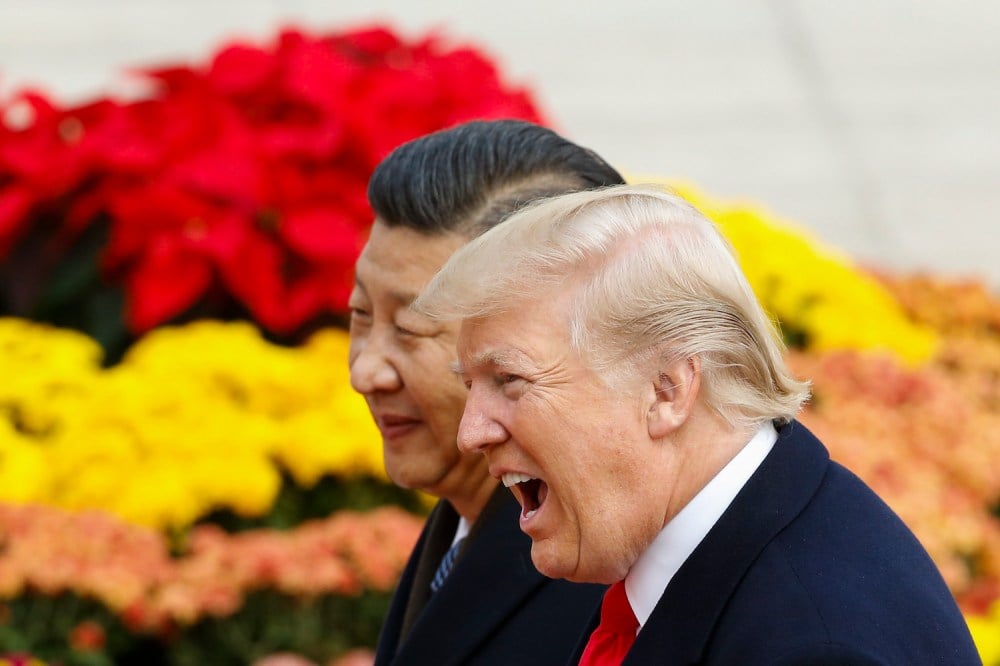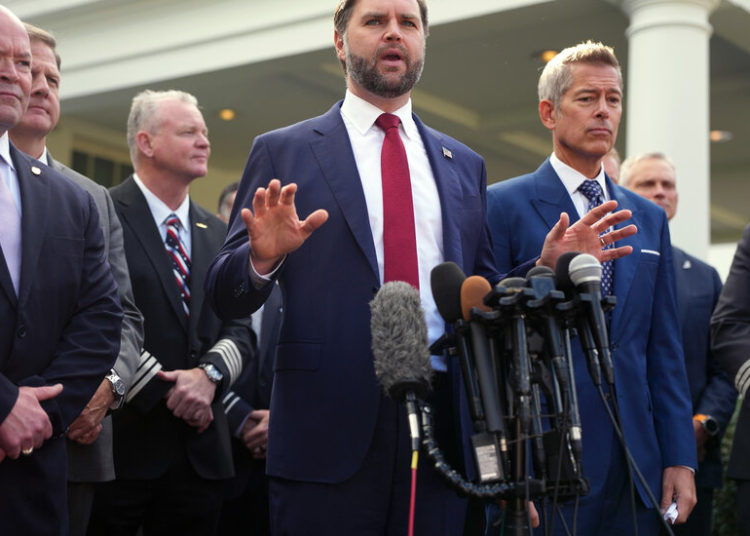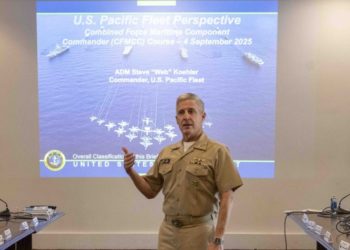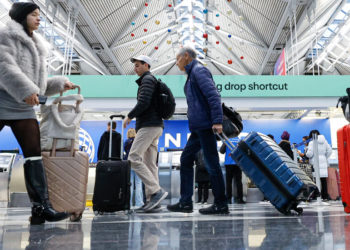Since President Donald Trump’s second term began, his administration’s approach to China has been arguably the toughest aspect of its foreign policy to parse. In part, that’s because the top members of Trump’s team haven’t always seemed to be on the same page with each other or with the president on the question of just how confrontational to be with America’s closest superpower rival.
If there was something of an emerging consensus, it was that Trump has been willing to confront China on trade and economic issues — though through its effective weaponization of rare earth mineral supply chains, the nation has proved tougher to pressure via trade than most other countries on the receiving end of Trump’s tariffs. At the same time, he has been less interested in competing militarily and geopolitically with China, a competition that has consumed much of Washington — including his own first-term administration — in recent years.
Heading into Trump’s meeting on Thursday with Chinese leader Xi Jinping in South Korea, Semafor’s Ben Smith predicted the occasion would “end Washington’s decade of China hawks.” The fear among many was that Xi would exploit Trump’s desperation for a trade deal for concessions on the geopolitical questions he knows Trump is less interested in. In particular, Xi is reportedly seeking a statement from Trump formally opposing Taiwan’s independence. (The current US position is that it does not support a unilateral move toward Taiwan independence. That might not seem like a major distinction, but this is a conflict where subtleties like this can have enormous consequences.) Before the meeting, one Trump aide told NBC News that “everyone is holding their breath” to hear what he would say about Taiwan.
In the end, according to Trump, the issue did not even come up at the meeting in Korea. In the talks that Trump rated a “12 out of 10,” the two leaders reached a truce of sorts of trade issues: Trump said he would reduce tariffs on China by 10 percentage points, while Xi agreed to resume US soybean purchases, lift restrictions on rare earths exports, and promised to crack down on Chinese exports of chemicals that are used to make fentanyl.
So, has the temperature been lowered? Well, sure — for all issues but the small matter of nuclear war.
Trump drops a nuclear “bombshell”
Just minutes ahead of the meeting with Xi, Trump posted a message on Truth Social announcing that he had ordered the resumption of nuclear testing:
It’s hard to know exactly how to interpret this announcement since most of it is inaccurate. Russia has more nuclear weapons than the United States; the ongoing US nuclear modernization program is years from completion. China is building up its arsenal, but it won’t be even with the US in five years under even the most dire Pentagon estimates. The Department of Energy, not Defense, is responsible for nuclear testing.
No country, other than North Korea, has actually detonated a nuclear weapon since the 1990s. It’s possible Trump was referring to Russia’s recent test of a nuclear-capable and nuclear-powered torpedo.
Trump didn’t answer a reporter’s question about the announcement in Korea, and the White House has not yet responded to Vox’s request for clarification. Though the US has never ratified the global treaty banning nuclear tests, it hasn’t carried one out since 1992. But there has been speculation this could change. The Heritage Foundation’s Project 2025 suggested that the US should “indicate a willingness to conduct nuclear tests in response to adversary nuclear developments if necessary.” But this announcement is not motivated by technical necessity; the US and other nuclear states have a number of ways of testing the reliability of their arsenals without actually detonating them. Rather, it’s driven by a desire to demonstrate the credibility of the US deterrent.
If Trump actually means a return to active nuclear testing — detonating warheads — that would be a major escalation that could prompt reciprocal moves from Russia and China. It’s a tough move to square with his repeatedly stated desire for “denuclearization” talks with both Russia and China.
Whatever he actually intends, the timing just before a meeting billed as a deescalation of US-China tensions doesn’t seem coincidental.
Is there still risk of a clash over Taiwan?
There will be some sighs of relief in both Washington and Taipei that Trump did not “sell out” Taiwan’s autonomy for a deal on soybeans. That doesn’t mean the issue — the most likely flashpoint that could cause a US-China military conflict — is likely to go away. Trump may not be interested in war with China, but war with China could still be interested in him.
Trump has said he does not believe Xi will attack Taiwan, despite the island being the “apple of his eye,” and that may well be true given how daunting an all-out amphibious invasion could be with or without US involvement. But China’s moves to ramp up pressure on the country — which Beijing considers a rebellious province — seem more plausible. Those moves could range from increasing cyberattacks, to seizing one of Taiwan’s smaller outlying islands, to imposing a full blockade. And these possibilities that fall short of total conquest raise the question of how the US would respond.
Under legislation passed in 1979, the US is obligated to take measures to help Taiwan resist any use of force to change its status, but subsequent administrations have long been coy about whether this would mean actually using military force to protect Taiwan from invasion — a policy known as “strategic ambiguity.” Joe Biden came about as close as any president ever had to abandoning this policy, saying on four separate occasions that he believed the US was obligated to defend Taiwan, though administration officials always walked these statements back.
Trump has not said anything like that, which Jason Hsu, a former Taiwanese legislator and who is currently a senior fellow at Hudson Institute, told me may actually be for the best. “If he said, ‘Okay, America would defend Taiwan,’ then that would make Taiwan relax,” Hsu said. In Taiwan’s neighborhood, relaxation can be dangerous. “We need to get ourselves together and bolster our self-defense.”
At the same time, this is clearly not the Trump administration posture toward Taiwan that many were expecting. When I visited Taiwan last year, just prior to the US election, I found officials and ordinary citizens fairly optimistic about what a potential second Trump administration would mean for them. It’s not hard to understand why. During his first term, Trump broke precedent by speaking directly with Taiwan’s president. He dispatched two Cabinet officials to visit the country — the highest-level US official visits to the country since the 1970s. And he increased arms sales, including some systems that the Obama administration had withheld. Trump’s first term secretary of state, Mike Pompeo, later called in 2022 for the US to formally recognize Taiwan’s independence.
In this term, by contrast, as Trump has pursued a US-China trade deal, he has declined to approve $400 million in arms sales to Taiwan, and he told Taiwan’s president, William Lai, to avoid a stopover in New York in July.
But the Pentagon is not out of the China competition game entirely. Also just ahead of Thursday’s Trump-Xi meeting, CBS reported that the US military’s Indo-Pacific Command had given an order for a “show of force” operation to deter Chinese aggression in the South China Sea — though it’s unclear if the US operation will actually be carried out. Trump also announced on Thursday that the US would allow South Korea to access the technology needed to build a nuclear submarine, another move that China is likely to see as provocative.
Are we sleepwalking into war?
Still, overall, the administration has signaled that preparing for military confrontation with China is not a major issue. The fleet of autonomous drones that the Pentagon had been building to surveil China is well behind schedule. The Pentagon’s forthcoming national security strategy is expected to downgrade Chinese competition, to place it below border security and Western Hemisphere issues.
“I think the Biden administration was strategic, but not ambiguous,” Zack Cooper, a senior fellow at the conservative American Enterprise Institute who studies US-China competition, told Vox. “The Trump administration is ambiguous, but maybe not very strategic.”
Given what we know about Trump’s attitude toward the use of military force — he prefers quick, decisive strikes against weaker targets like Iran, the Houthis, or alleged drug boats in the Caribbean that don’t have any capacity to retaliate or get the US involved in a protracted conflict — it’s hard to imagine him getting embroiled in a conflict with China. Even under the most optimistic scenarios (ones that don’t go nuclear), a war like that would involve the kind of losses that the US hasn’t seen since World War II.
“In a Taiwan scenario, if you bomb China, they’re going to bomb you back,” said Jennifer Kavanagh, senior fellow at Defense Priorities.
Kavanagh, who advocates a policy of dialing back the US defense buildup in Asia, said that as Taiwan manages its own relations with Beijing and prepares for potential military conflict, “I think it’s really important to assume that the US won’t come.”
On the other hand, Trump is nothing if not unpredictable, as the nuclear testing announcement on the eve of his summit demonstrated. The next few years of history in Asia may hinge on just how much Xi is willing to test that unpredictability.
The post A trade truce, a nuclear threat: What to make of the Trump-Xi meeting appeared first on Vox.




